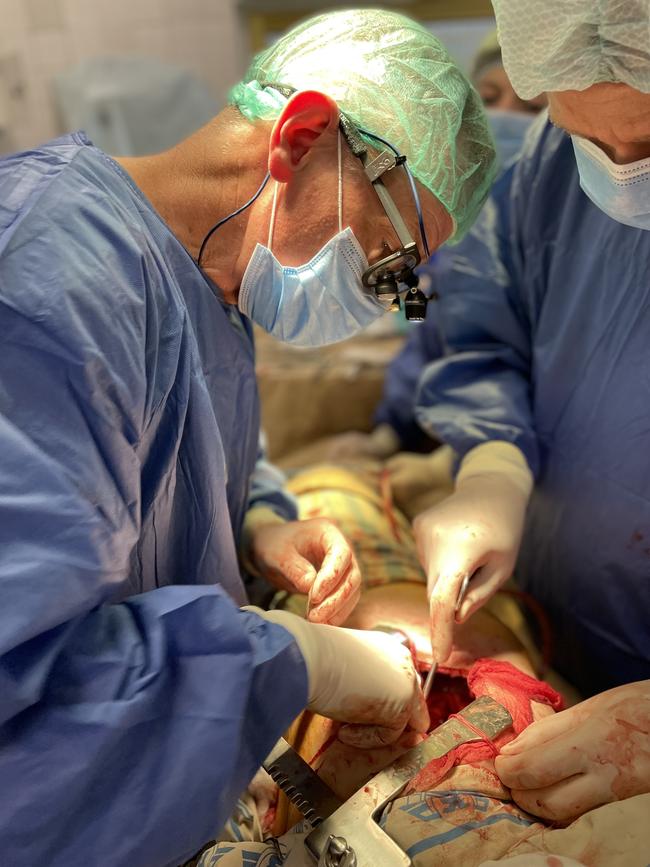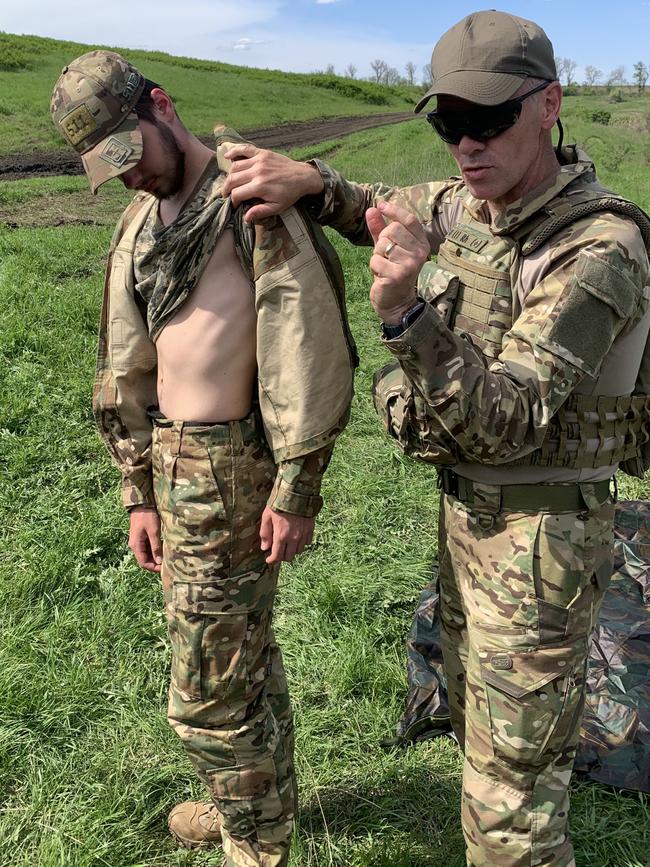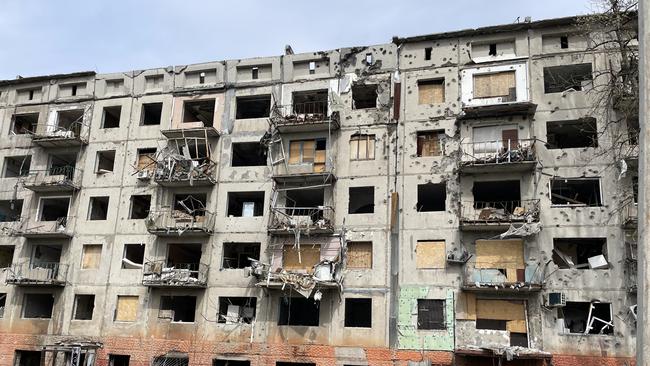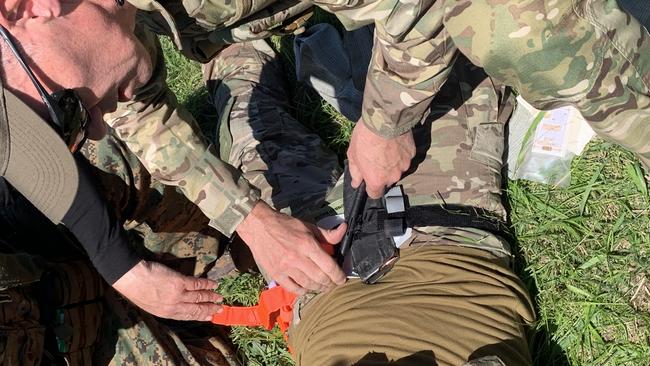Adelaide surgeon tells of life in the front lines in Ukraine
Dr Craig Jurisevic says he knew the risks before he travelled to the most dangerous place on Earth. But he also knew why he had to do it.
SA News
Don't miss out on the headlines from SA News. Followed categories will be added to My News.
Life on the front lines in Ukraine is “surreal and inspiring”, Adelaide surgeon Dr Craig Jurisevic says.
After seeing the carnage of Russia invading Ukraine, he jumped on a plane to put his finely honed skills to use to save lives.
In five months in a European war zone he has been treating soldiers who have lost limbs yet who did not complain and were back in action within weeks, and seeing civilians lose their homes to missile blasts yet carrying on as normal the next day.
He was dealing with dozens of casualties a day while narrowly avoiding death from strikes in and around front-line cities, some of which killed team members.
Dr Jurisevic’s humanitarian drive to use his skills to help in some of the world’s worst war zones is partly inspired by his grandfather’s experience as a prisoner in the Nazi concentration camp Dachau.
He told The Advertiser the Russian invasion was reminiscent of the darkest days of World War II.
“The war in Ukraine has had a devastating effect on the people, its infrastructure and its health system,” he said.
“The number and severity of the combat casualties is unlike anything seen since the Second World War. This is a war of attrition, fought across a vast front line, through seasonal temperature extremes, with mass casualties daily.
“The Ukrainian health system had to adapt almost overnight to cope with the onslaught of thousands of war casualties, civilian and military.
“Medical staff had to switch, almost overnight, from being peacetime workers caring for peacetime ailments, to trauma teams caring for enormous numbers of horrifically injured soldiers, and civilian victims of artillery and missile attacks.
“It is because of this desperate need for trauma surgeons with experience in treating casualties in combat zones that I volunteered to help.
“My experience operating at and near the frontline, sometimes in the midst of actual combat, has made me adept at operating, teaching and surviving in these environments.”

Dr Jurisevic summarised what happens to soldiers from point-of-injury at the battlefront, to the rehabilitation down the line.
Frontline first aid is called TCCC — Tactical Combat Casualty Care.
This is:
PROVIDED by front line medics and fellow soldiers in the trenches/battlefield;
ALSO by trained small specialised Army units;
IS different to normal first aid and involves techniques for treating the casualty while under fire while returning fire.
There are four main roles in treating casualties, from immediate lifesaving attention on the frontline, through to rehabilitation.
Role 1 Unit has to stabilise the soldier, within 1km of the battle front, using small tents or underground trench bunkers, with a medic or doctor putting in IV lines and giving lifesaving airway/breathing treatment while within artillery and missile range.
Role 2 involves emergency surgery — damage control surgery — at a distance of 0km to 35km from the fronts at towns such as Druzhkivka, Kramatorsk and Sloviansk.
This includes life saving surgery to stop bleeding, amputations, dealing with fractures, with the patients quickly sent to the next level of care in a safer area. This is all within missile or drone range, “often attacked and hit. Many near misses.”
Role 3 is specialised surgery at 200km or more from the front at Dnipro, in a large hospital with CAT scanners and specialist surgical teams. There is less likelihood of being hit but are still frequent missile and drone attacks.
Role 4 involves reconstructive surgery and rehabilitation in the major cities of Kyiv or Lviv.
“My activities in Ukraine have included training frontline units near the Bakhmut front in front line first aid, including advanced techniques for specialised military units,” Dr Jurisevic said.
“Also in extraction of casualties under fire; in techniques to extract casualties in trenches while under fire; and teaching rescuers and the injured techniques to fight while moving to safe areas for treatment.
“These areas were under artillery and missile fire during my time there.”

In Druzhkivka and Kramatorsk Dr Jurisevic worked on damage control surgery of injured solders, with casualties in the hundreds daily.
He also has been training people in a new technique called REBOA to stop major bleeding using a small catheter introduced into a groin artery through a small hole.
This stops all the bleeding in the abdomen and legs and buys time to operate on the casualty before they bleed to death.
“This technique was used successfully in Kramatorsk and will now be used widely across the front line surgical units,” Dr Jurisevic said.
He is also training people in using a portable ultrasound scan to quickly check for bleeding in the abdomen and chest (FAST scan), as well a procuring surgical supplies through his network of contacts.
“Our unit in Druzhkivka was hit in February, killing three,” he said.
“My unit in Kramatorsk narrowly missed being hit, by 150m, by two S-300 missiles while I was there.”

In Dnipro where there are 1500 hospital beds including 100 ICU beds he has received soldiers from the Role 2 units who had undergone damage control surgery and needed further surgery.
The work was relentless — up to 70 casualties every day, operating and training in chest trauma surgery, training of the sole chest surgeon in the hospital and helping source surgical supplies through Ukrainian groups in Australia.

Throughout, he has witnessed incredible bravery and ongoing resilience of the Ukrainian people.
“Young soldiers I treated near the front, many of whom had lost limbs, lay quietly without complaining despite being in incredible pain,” he said.
“Many also had chest, abdomen and head injuries, yet they rarely requested much pain relief.
“Several who had below knee amputations went back to the front at 6-8 weeks with their temporary leg prosthesis to help fly drones.
“Civilians hit with outlawed white phosphorous munitions, often with amputations, would ask that the nurses attend the severely injured soldiers before attending to their own injuries.
“Volunteers with no military training, often in their 70s, could be found near the front bringing supplies to the soldiers, transporting the injured to hospital in their own cars.
“Many of these volunteers are killed or injured but they keep arriving all along the 200+km front.
“I witnessed several missile blasts in Dnipro and Kramatorsk that struck civilian targets. The people have become stoically immune to the horror and quickly clean up the damage and return to as normal a life as possible.
“Sometimes they can be seen the next day carrying on as if nothing had happened, moving into a neighbour’s apartment, with theirs in close view, blood stains still marking the destroyed walls, windows and doors.
“It is truly surreal, yet inspiring.”
While much of the spotlight on Australian and other foreign aid to Ukraine has focused on military hardware as they defend their land, as a surgeon Dr Jurisevic has other priorities.
He is working hard as an intermediary between Ukrainian military officials and the Australian government to procure armoured military ambulance vehicles for the front line.
“The most pressing problem I came across was the lack of such vehicles,” he said.
“The Ukrainian military rely heavily on a fleet of donated civilian SUV/4WD vehicles to carry the injured from near the point of injury to the Role 1 and Role 2 Units.
“Many of these are old — 20 year old Mitsubishi Pajeros, 30 year old Lada 4WDs, and even 2WD Ford Transits — all are unarmoured and virtually all are completely inadequate in the muddy, heavily-mined terrain.
“In the week before I left several of the teams I trained lost members when their vehicles were hit by artillery and mortar shrapnel.”
While some workers are with non-government organisations (NGOs) Dr Jurisevic went on his own.
“I organised and paid for it myself and made personal contact with medical and military authorities. Nothing to do with the Australian government or any NGO,” he said.
“My main reason for speaking with the media is to pressure our government to supply armoured ambulances for the teams I trained on the eastern front. I have acted as an intermediary and passed on a formal request for the Ukrainians to the Australian Defence Department via the Ukrainian embassy in Canberra.”
While skills are welcome Dr Jurisevic gives a sobering note of caution.
“I wouldn’t recommend this work to anyone without adequate training and experience in conflict zone/front line medical work,” he said.
“One has to be able to fully assess and appreciate the security risks and handle their own personal security situation.
“You have to accept the risks involved.
“I have worked in many war zones and each experience builds on the last making one better able to cope with the extreme challenges of this work.”
Dr Jurisevic has not made plans to return to Ukraine but will use his contacts and influence here to support the medical teams in Ukraine.
“My motivation is this: I would want someone with the best skills and experience looking after my family and friends, were war or natural disaster to visit our shores,” he said.
“I am sure foreigners with those skills would come to aid us, were we in the same situation as the poor Ukrainians.”





